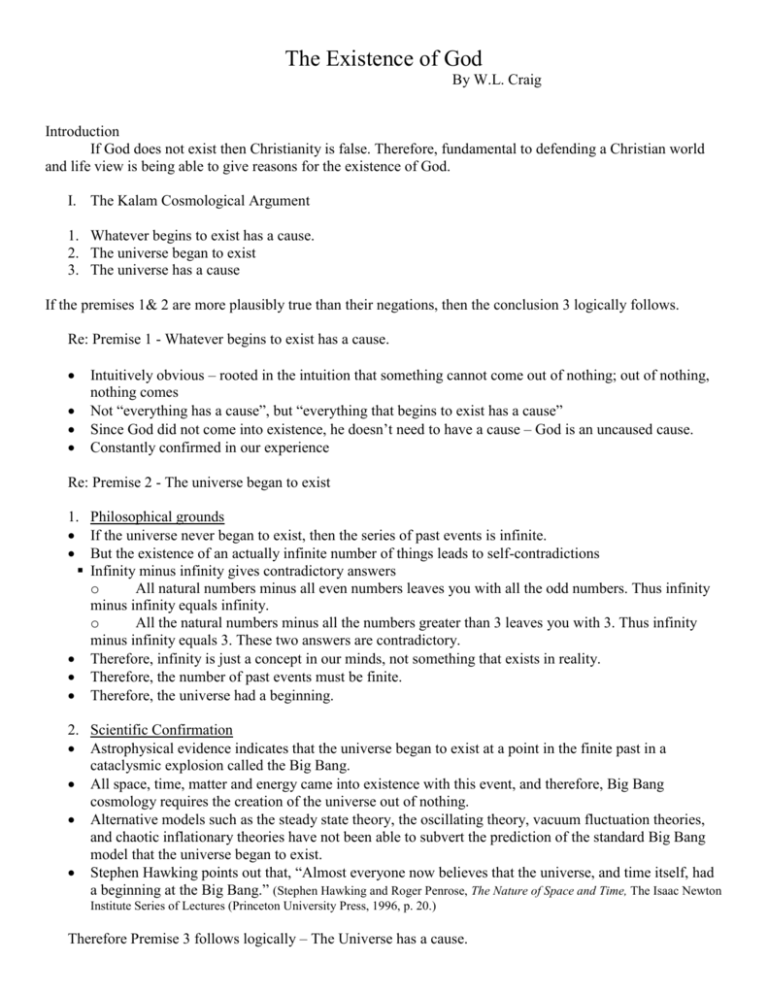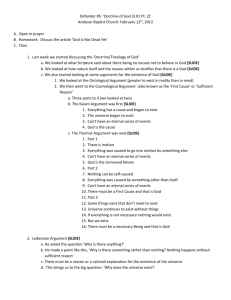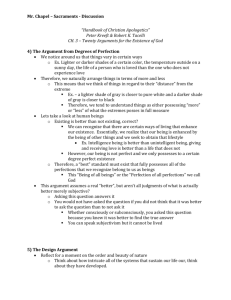The Existence of God
advertisement

The Existence of God By W.L. Craig Introduction If God does not exist then Christianity is false. Therefore, fundamental to defending a Christian world and life view is being able to give reasons for the existence of God. I. The Kalam Cosmological Argument 1. Whatever begins to exist has a cause. 2. The universe began to exist 3. The universe has a cause If the premises 1& 2 are more plausibly true than their negations, then the conclusion 3 logically follows. Re: Premise 1 - Whatever begins to exist has a cause. Intuitively obvious – rooted in the intuition that something cannot come out of nothing; out of nothing, nothing comes Not “everything has a cause”, but “everything that begins to exist has a cause” Since God did not come into existence, he doesn’t need to have a cause – God is an uncaused cause. Constantly confirmed in our experience Re: Premise 2 - The universe began to exist 1. Philosophical grounds If the universe never began to exist, then the series of past events is infinite. But the existence of an actually infinite number of things leads to self-contradictions Infinity minus infinity gives contradictory answers o All natural numbers minus all even numbers leaves you with all the odd numbers. Thus infinity minus infinity equals infinity. o All the natural numbers minus all the numbers greater than 3 leaves you with 3. Thus infinity minus infinity equals 3. These two answers are contradictory. Therefore, infinity is just a concept in our minds, not something that exists in reality. Therefore, the number of past events must be finite. Therefore, the universe had a beginning. 2. Scientific Confirmation Astrophysical evidence indicates that the universe began to exist at a point in the finite past in a cataclysmic explosion called the Big Bang. All space, time, matter and energy came into existence with this event, and therefore, Big Bang cosmology requires the creation of the universe out of nothing. Alternative models such as the steady state theory, the oscillating theory, vacuum fluctuation theories, and chaotic inflationary theories have not been able to subvert the prediction of the standard Big Bang model that the universe began to exist. Stephen Hawking points out that, “Almost everyone now believes that the universe, and time itself, had a beginning at the Big Bang.” (Stephen Hawking and Roger Penrose, The Nature of Space and Time, The Isaac Newton Institute Series of Lectures (Princeton University Press, 1996, p. 20.) Therefore Premise 3 follows logically – The Universe has a cause. The Nature of the Cause Since the cause created space and time, it must transcend space and time. Timeless and spaceless implies immaterial. Uncaused Unchanging Enormously powerful Personal 1. The only immaterial, timeless objects that we are familiar with are minds or abstract objects (like numbers), but abstract objects cannot cause anything. Therefore the cause must be a mind, a self, an intelligence. 2. The cause is timeless and eternal, but the effect, the universe, only began to exist a finite time ago. If the cause is eternally present and is sufficient to bring about the effect, then why hasn’t the effect been eternally present? The only way is if the cause is a personal agent endowed with freedom of the will who can choose to when to produce the effect. II. The Fine Tuned Universe Teleological Argument 1. The fine tuning of the universe is due to either law, chance or design. 2. The fine tuning of the universe is not due to law or chance. 3. Therefore, the fine tuning of the universe is due to design. Fine Tuning Initial conditions of the universe appear to be finely tuned to precisely the right values for the existence of intelligent life. Re: Premise 2 - The fine tuning of the universe is not due to law or chance. Not law because they are initial conditions Not chance because the odds are overwhelming – Roger Penrose calculates the odds of the entropy conditions being just right for life are 1/10(10)127 Therefore, Premise 3 follows logically - The fine tuning of the universe is due to design. III. The Moral Argument 1. If God does not exist, then objective moral values do not exist. 2. Objective moral values do exist. 3. Therefore, God exists. Re: Premise 1 - If God does not exist, then objective moral values do not exist. By objective moral values we mean values that hold and are valid independent of whether anyone believed them or not. If God does not exist, then objective moral values do not exist. o Values would just be byproducts of sociobiological conditioning and therefore relative to time and place, or they would be merely personal opinion. o Animals, which is all humans would be, are not moral agents. Re: Premise 2 - Objective moral values do exist. Appeal to people’s basic moral intuitions and 90% + of sincere people will acknowledge the existence of objective moral values. o “Do you really think it is right for an intruder to break into your house, slash your wife’s face and sexually assault her? Premise 3 – God Exists follows logically Objection: To say that God is the ground for morality is to say that God arbitrarily chooses what is right and wrong and could just as easily have chosen rape and murder as good. Response: God is essentially holy and good and God’s commandments are necessary expressions of his essentially good nature, not arbitrary. IV. The Immediate Experience of God Argument This is not an argument per se, but the claim that you can know God exists wholly apart from argument by having an immediate experience of God. 1. Beliefs which are appropriately grounded may be accepted as basic beliefs not grounded in argument. 2. Belief that the Christian God exists is appropriately grounded. 3. Therefore, belief that the Christian God exists may be accepted as a basic belief not grounded in argument. Re: Premise 1 - Beliefs which are appropriately grounded may be accepted as basic beliefs not grounded in argument. 4. Our beliefs like the external world is real (i.e. we are not brains in vats), the past is real (it actually existed), and other minds exist other than our own, cannot be proved, but it is still rational to hold them because they are grounded in our personal experience of the external world, the past, and other minds. Therefore, they are properly basic beliefs. Re: Premise 2 - Belief that the Christian God exists is appropriately grounded. 5. Belief in the Christian God is grounded in the experience of God himself as mediated to us through the inner witness of the Holy Spirit. Therefore, Premise 3 follows logically - belief that the Christian God exists may be accepted as a basic belief not grounded in argument. These four arguments provide a powerful cumulative case for the existence of God.







